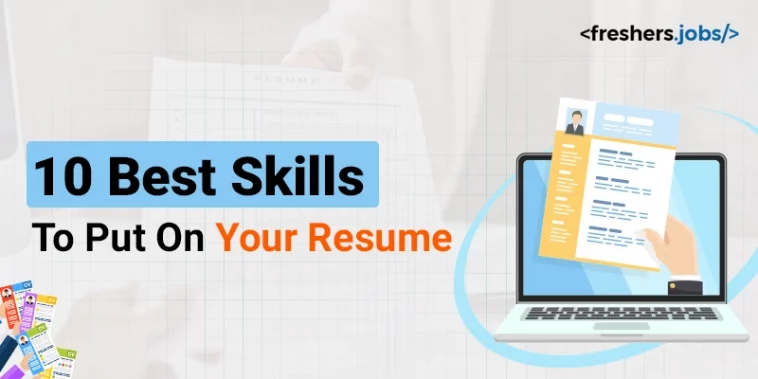Are you preparing for interviews? It is essential to build a resume that highlights your skills and talents, making you stand out from your competitors. In addition to specifying your educational qualifications and past work experiences, you need to provide genuine insights into your various skills. This will attract potential employers and the HR panels of hiring organizations, helping them shortlist you. Let’s explore the skills you should include in your resume, along with essential tips for creating a compelling document.

What Are Resume Skills?
Your resume should have a skills section. It acts as a powerful tool for showcasing your abilities and qualifications to potential employers. By explicitly listing your skills, you make it easier for recruiters to quickly identify reasons why they should consider you for the specific role. This section highlights your technical proficiencies and soft skills, like that of your communication, problem-solving, and teamwork capabilities.
Specifying all your skills with relevant keywords and the number of achievements further strengthens your resume. It increases your chances of getting noticed in applicant tracking systems (ATS) and by human recruiters. Here are 10 Best skills to put on a resume and make it stand out from those of the rest.
1. Communication Skills
The first skill to be specified in a resume is about your communication. You need to possess excellent communication skills in order to effectively collaborate with the teams, solve problems, and build relationships in a professional environment. Some examples you can mention include your listening skills, speaking and written communication in English and other languages, and your presentation and interpersonal skills.
2. Problem-Solving Skills
You need to mention your problem-solving skills and your ability to analyse complex issues, identify the root causes, and how you develop creative solutions to the problems. You can also add information from your previous work experiences on your efficiency in handling problems and crisis situations. For example, you can provide hints on skills like critical thinking, analytical skills, decision-making, and creative thinking.
3. Adaptability
Your resume should include clues on how adaptable you were according to the changing work environments. such information impresses the employers and makes their job easy to shortlist you. You can also highlight your positive qualities like flexibility, resilience and your quickness in learning new things.
4. Teamwork
It’s important to highlight your teamwork skills and share examples of how you collaborated with others to meet deadlines. You can identify your interpersonal skills and make a list of the various teams you were part of in your previous roles. If you are a fresher, you can comfortably express your eagerness to work in diverse teams, as this willingness to collaborate with team members at work can be a plus point in your resume.
5. Time Management
You can specify your time management skills and explain how you were able to meet deadlines and deliver work without excuses. Describe your organizational and planning skills, and detail how you prioritize and compartmentalize different sections of your work.
6. Leadership
Leadership skills are important if you are aiming for either management or non-management roles. These skills always reflect your initiative, ability to influence others, decision-making and capacity to motivate a team. You can demonstrate these skills as they set you apart in your career. Your leadership abilities also show Your willingness to embrace challenges and positively contribute to the work environment is commendable.
7. Technical Skills
It’s important to specify your technical skills on your resume. For example, if you are aiming for higher positions in the software industry, you should mention your proficiency and technical expertise in the software technologies such as Microsoft Office, Data analytics, cyber security or graphic designing.
Additionally, include details about the programming languages you know and the tools and technologies in which you have expertise. A strong foundation in these technical skills not only improves your individual performance but also fosters the success of a team or organization. If you are a fresher and applying for entry-level positions, you can list the technologies you are familiar with.
8. Attention To Detail
Your skills for resume should also include information on how you pay close attention to minute details at work. Throughout your resume, pay attention to the minute details. Spot the errors or any unnecessary information and rectify it quickly. Keep your resume updated and present all information with clarity. Thoroughness in tasks ensures that every aspect is considered and addressed, leading to more reliable and polished results. Ultimately, this attention to detail leads to excellence, where the importance of quality is recognized and prioritized.
9. Emotional Intelligence
You can highlight your empathy, self-awareness, and other social skills in your resume. If needed, provide details on how you can understand and manage emotions and how good you are at effectively building professional relationships. Depending on the job you are applying for, include the relevant details. Information on the vacancies for Freshers Jobs are regularly updated in job websites.
10. Continuous Learning
Skills to put on a resume also include your willingness towards learning new technologies according to changing times. You can express your interest and enthusiasm for learning new things as part of your career, as well as your agility and adaptability to changes in the work environment. Mention any online courses you have taken from time to time and the workshops you have attended to enhance your skills.
Hard Skills Vs. Soft Skills On A Resume
While hard skills represent your specific technical abilities and knowledge, soft skills concentrate on the interpersonal qualities and your character traits. Both these skills are essential for achieving professional success and should be included in your resume. Hard skills, including the programming languages, data analysis, or software proficiency, are often quantifiable and you can easily list them clearly.
Soft skills, like communication, leadership, and time management, are more nuanced and require examples to illustrate their impact. You need to balance hard and soft skills on your resume effectively to present a well-rounded profile that appeals to employers looking for candidates with good technical expertise and strong interpersonal abilities.
In conclusion, you should incorporate relevant skills from the list above into your resume. Tailor it to genuinely reflect your abilities and impress potential employers.
Latest Job Alert information are available in dedicated online job portals.



